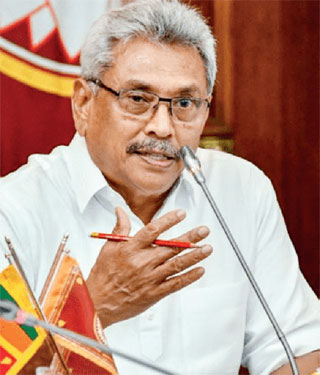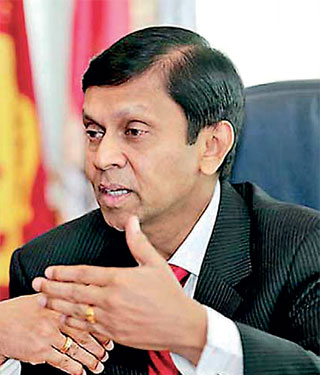Tuesday Feb 17, 2026
Tuesday Feb 17, 2026
Friday, 21 January 2022 00:00 - - {{hitsCtrl.values.hits}}

President Gotabaya Rajapaksa

Finance Minister Basil Rajapaksa

Central Bank Governor Nivard Cabraal
|

The ongoing controversy over the recent sovereign debt repayment has revived public awareness of the crucial role of International Financial Institutions (IFIs) such as the IMF and also of credit rating agencies for a country like Sri Lanka, reliant on access to external capital markets for its functioning while being acutely vulnerable to their borrowing conditions.
In debates on whether or not to go to the IMF and how to deal with the ratings downgrades, Dr. Nishan de Mel has repeatedly urged that in any approach to the IMF, Sri Lanka must draw up its own recovery plan to confidently present it at the negotiations, instead of relying on the lending institution to impose its own. The wisdom of this approach is borne out by the many UN experts who have been reporting to the UN Human Rights Council and the UN General Assembly on the impact of loan conditionalities imposed by IFIs and the complicity of rating agencies in exacerbating if not contributing to global economic crises.
The UN Independent Experts refer to two documents endorsed by the Human Rights Council, namely the Guiding Principles on Foreign Debt and Human Rights, and the Guiding Principles on Business and Human Rights: Implementing the United Nations “Protect, Respect and Remedy” Framework.
These documents address the human rights responsibilities of States as well as private businesses and creditors in their decisions on foreign debts. The principles emphasise “transparency, participation and accountability” as “core values that should be observed in the lending and borrowing decisions by States, international financial institutions and other actors as appropriate, the negotiation and execution of loan agreements or other debt instruments, the utilisation of loan funds, the making of debt repayments, the renegotiation and restructuring of external debts, and implementation of debt relief when appropriate”.
The Experts warn that a Human Rights impact assessment is imperative, by both the lender and the borrower, noting that neither international financial institutions nor commercial agreements are above international law. They are all obliged to respect the international human rights treaty regime.
‘Retrogressive reforms’: IFI complicity
In July 2017, a former Independent Expert on the promotion of a democratic and equitable international order reporting to the General Assembly on the impact of the conditionality of loans from IMF on development and human rights urged the IMF and the World Bank to “to embrace new so-called ‘smart’ lending practices with a view to promoting development and human rights, for the benefit not only of bank and speculators, but billions of human beings”.
In the report, he notes the “shared responsibility of the international financial institutions in the weakening of the State through the imposition of structural adjustment programs, in particular in highly indebted countries of the global South”.
A July 2019 report to the UNGA on Foreign Debt detailed the “the responsibility for complicity of international financial institutions in human rights violations in the context of retrogressive economic reforms”, presenting examples from country visits.
In 2020, the Independent Expert on the promotion of a democratic and equitable international order urged that economic reforms attached to loans, such as austerity measures, be carefully assessed to prevent retrogressive measures to ensure “maximum available resources” are devoted to the realisation of economic, social and cultural rights, reiterating that “Such human rights impact assessments should be undertaken by both lending and borrowing States but similarly by international financial institutions prior to granting loans with conditionalities.”
Credit rating agencies: “The alarm that never rings”
The UN Human Rights Council has taken serious interest in credit rating agencies and their role in relation to their human rights obligations especially in the context of the COVID-19 pandemic.
At the March 2021 sessions of the UNHRC, the Council’s “Independent Expert on the effects of foreign debt and other related international financial obligations of States” made a substantial critique of credit rating agencies, particularly the “Big Three”, making several recommendations for reform which she said “could no longer be postponed”.
She reminded the international community of the devastating role played by credit rating agencies in the sub-prime mortgage crisis and the Asian financial crisis which she says “exposed the inherent structural problems of these agencies and their failure to perform the role they are supposed to.”
In presenting her report to the UNHRC, the Independent Expert held these agencies responsible for exacerbating rather than warning of financial crises:
“Credit rating agencies have been called “the fire alarm that never rings.” Actually, instead of warning of the coming of the crisis, they end-up contributing to it. A more effective, human rights-based international financial architecture is required now more than ever in order to respond to the socioeconomic downfall resulting from the global pandemic.”
She lists multiple problems and failures in the operations of credit rating agencies, including “the characteristics of an oligopoly; conflicts of interest; procyclicality in rating; inaccuracy or errors in their statements, rating warnings and downgrades; a lack of transparency; and accountability.”
The “Big Three” agencies, Standard & Poor’s, Moody’s Investors Service and Fitch Ratings, hold 94% of the outstanding credit ratings with Standard & Poor’s and Fitch Ratings occupying about 82%, according to her report, which reveals that they also have cross-holdings of shares among them forming an oligopoly “with quasigovernmental status”.
The report concludes that this gives them “too much comfort and too little incentive to strive to hand out objective judgments of sovereign and private borrowers.” As evidence of their past misconduct, she notes, “In 2015, Standard & Poor’s paid about $ 1.4 billion to settle allegations that it had boosted ratings on mortgage-backed securities in the run-up to the crisis in the United States, including in different states in the country, admitting that it had held off on downgrades for fear of losing market share. Moody’s Investors Service paid $ 864 million in 2017 to settle similar charges.”
Consequently, the Commission of Experts of the President of the United Nations General Assembly on Reforms of the International Monetary and Financial System had concluded that “the credit rating system was one of the specific areas most urgently in need of reform.”
The Independent Expert concludes, “The disclosure of the rating methodology, key criteria and standards should be made so that investors and borrowers could be in a better position to do their own due diligence and assess the accuracy of the ratings.”
IMF reforms
In his report dated July 2017 which examines the impact of the conditionality of loans from the International Monetary Fund on development and human rights, the Independent Expert on World Order expresses his opinion that the “IMF should change its priorities and finally let go of the outdated conditions of privatisation, deregulation of markets, and ‘austerity’ in social services, which in the past have engendered human rights violations.”
He warns that “In the modern, globalised world, no one can opt out of what may be referred to as the customary international law of human rights” and that the IMF should pay more attention to the human rights impact of its decisions:
“... in the discharge of its functions, IMF should ensure that its lending practices, and in particular the “conditionality” thereof, do no harm to developed or developing economies and do not conflict with established human rights norms, such as by imposing privatisation of government services, deregulation of markets or “austerity” measures that, as empirical evidence has shown in many cases, have led to widespread unemployment and misery.”
He advises the IMF “to anticipate the consequences of the “conditionality” of its lending practices and to integrate ex ante human rights assessments so that its activities do not lead to violations of human rights.” He also recommends an “effective mechanism in place to monitor the impacts of IMF activities and to apply prompt corrective measures as needed.”
The report quotes IMF insiders such as senior IMF economist Davison Budhoo who “memorably resigned, after accusing the Fund of using ‘statistical malpractice’ in order to exaggerate the level of economic crisis in countries, following which IMF would propose its own solutions.” Providing another example, he says that in Trinidad and Tobago “the oil-rich country was made to look far less stable than it actually was.” Incredibly he also reports that Davison Budhoo “contended that the Fund ‘invented, literally out of the blue’, huge unpaid government debts.”
In an unequivocal indictment, the report quotes the IMF’s own economist who says that these “gross irregularities”, which he claimed were “deliberate and not mere sloppy calculations”, were then used by financial markets which took them at face value and “promptly classified Trinidad and Tobago as a bad risk and cut off financing.”
The UN Expert cites further evidence: “Even the IMF Independent Evaluation Office concluded that the structural adjustment demands imposed on Asian countries were ‘ill-advised’, warning that ‘crisis should not be used as an opportunity to seek a long agenda of reforms just because leverage is high’.”
Karin Lissakers, who served as United States representative to the IMF Executive Board for most of the 1990s, is quoted as having written that the IMF imposed “harsh austerity on the debtors with the narrow objective of “free[ing] foreign exchange in order to service debts”.
Reiterating that “no international financial institution or commercial agreement is above international law” she advises them to request an advisory opinion from the International Court of Justice as to the “concrete application of human rights norms to international financial institutions”.
The Independent Expert on World Order recommends several reforms to the IMF’s loan conditions, urging them to prioritise among others, a moratorium on military expenditure (except for salaries and pensions) for the duration of the loan and adoption of legislation imposing fines on persons and corporations which evade taxes, and obliging citizens who have moneys hidden offshore to repatriate their wealth within a defined period of time, or otherwise face the risk of penal sanctions.
Declaring that “There is not a developed world and an underdeveloped world but a single world badly developed” (the motto of Centre Europe-Tiers Monde), he urges the IMF and the World Bank to work together with the UN for a more democratic world order.
Obligations of the State
In making borrowing decisions, States are held accountable for their impact on the welfare of their citizens. In July 2020, the Independent Expert on Foreign Debt made this clear: “States have the minimum core obligation to use the maximum available resources to progressively realise social, economic and cultural human rights, despite any disparity in resources available to them.” The expert warns that “economic analysis and decision-making should prevent the potential retrogression of economic, social and cultural rights”.
The expert clarifies what should be avoided to achieve this: “To allow wealthy and big corporations to enjoy substantial tax benefits, bailout money and other measures aimed at supporting the market for a lengthy period of time, while providing ordinary households and small and medium-sized companies most affected by the pandemic with only very short-term financial handouts or support, would not be the appropriate way of using financial resources and would certainly widen income inequality and inequitable access to medical and other services.”
The point is made that abiding by their human rights obligations in economic decision making “would create a more balanced, pro-economic and pro-social approach to development if those considerations were taken into account by countries at the policymaking stage. A human rights impact assessment of economic policies and reforms would provide a clear orientation for that process.”
Where decisions are made that affect the lives of hundreds of thousands of people, clarification is deemed necessary for “the attribution of responsibility and accountability for decisions, actions and implementation.”
In Sri Lanka, as the ever-darkening clouds of ongoing and imminent crises hover above the citizenry, they have to assess whether the duty of due diligence has been carried out by those responsible, and who is to be held accountable for what might soon befall them.